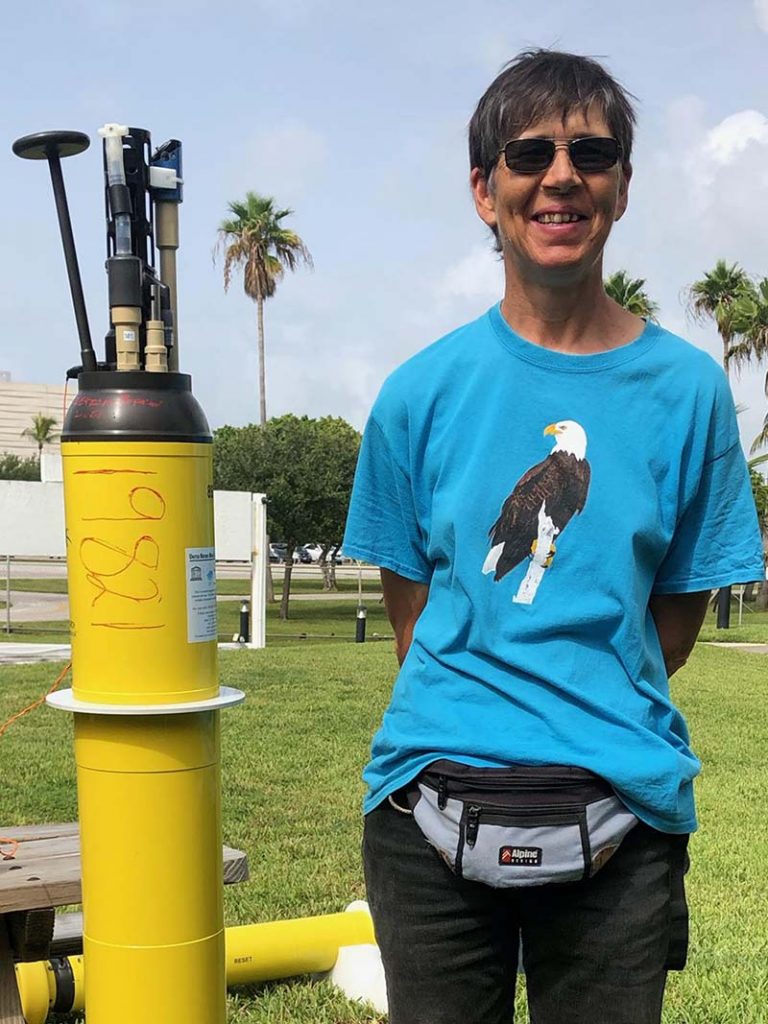
Research Highlights
Research Interests
Ocean heat storage and atmosphere ocean interactions.
Ocean circulation and water masses.
Analysis of Lagrangian and Hydrographic observations.
Analysis of model results.
Ocean observing systems.
Claudia Schmid, Ph.D.
Oceanographer, Physical Oceanography Division
305.361.4313
4301 Rickenbacker Causeway
Miami, Florida 33149
“Both seagoing oceanography and more autonomous observing methods are amazing. Collecting data with profiling floats that are distributed automatically in real-time is a dream come true. Such floats are deployed globally as part of the Argo project to monitor climate change, as well as in front of hurricanes to improve hurricane forecasts. Both are used for studying the ocean as well as atmosphere-ocean interactions world-wide.”
Dr. Claudia Schmid is an oceanographer with the Physical Oceanography Division at NOAA’s Atlantic Oceanographic and Meteorological Laboratory (AOML). Dr. Schmid is the Co-Principal Investigator of US Argo and the Manager of US Argo Data Assembly Center. Her research is focused on ocean circulation, ocean heat storage, and ocean-atmosphere interactions.
Current Work
Manager of the US Argo Data Assembly Center for core Argo and BGC Argo.
Manager of the Data Assembly Center for “hurricane floats” deployed by WHOI and AOML.
Collaborator in projects analysing of the mixed-layer budgets in the tropical Atlantic using data from PIRATA, Argo and surface drifters.
Analysis of the three-dimensional flow in the South and North Atlantic using data from Argo and AVISO.
Member of the Executive Committee of the International Argo Data Management Team.
Co-Principal Investigator of the US Argo Project
Collaborator in “Data Quality of Control as a Service”
1988, Vordiplom in Physical Oceanography, Institut f¨ur Meereskunde, Christian-Albrechts-Universit¨at in Kiel, Germany
1992, Diplom in Physical Oceanography, Institut f¨ur Meereskunde, Christian-Albrechts-Universit¨at in Kiel, Germany
1998, PhD in Physical Oceanography, Institut f¨ur Meereskunde, Christian-Albrechts-Universit¨at in Kiel, Germany
- Pita, I., Goes, M., Volkov, D. L., Dong, S. F. and Schmid, C. South Atlantic meridional overturning circulation and its respective heat and freshwater transports from sustained observations near 34.5°S Frontiers in Marine Science, 11, 1474133, https://doi.org/10.3389/fmars.2024.1474133 2024
Ref. 4487 - Reagan, J., T. Boyer, C. Schmid, and R. Locarnini. Global oceans: Subsurface salinity. In Chapter 3, State of the Climate in 2023. Bulletin of the American Meteorological Society, 105(8):S175-S177, https://doi.org/10.1175/BAMS-D-24-0100.1 2024
Ref. 4435 - Chidichimo, M.P., R.C. Perez, S. Speich, M. Kersalé, J. Sprintall, S. Dong, T. Lamont, O.T. Sato, T.K. Chereskin, R. Hummels, and C. Schmid. Energetic overturning flows, dynamic interocean exchanges, and ocean warming observed in the South Atlantic. Communications Earth & Environment, 4:10, https://doi.org/10.1038/s43247-022-00644-x 2023
Ref. 4220
National Oceanic and Atmospheric Administration Administrator’s Award 2022
For outstanding advances in the U.S. ocean observing and processing of biogeochemical Argo float data, leading to a new era of global oceanography.
Institute of Electrical and Electronics Engineers Cooperate Innovation Award 2022
For innovation in large-scale autonomous observations in oceanography with global impacts in marine and climate science and technology.
National Oceanic and Atmospheric Administration Administrator’s Award 2018
For outstanding success of the U.S. Argo ocean observing program, providing excellent oceanographic data that has led to a new era of oceanography.
Certificate of Appreciation, Atlantic Oceanographic and Meteorological Laboratory 2016
National Oceanic and Atmospheric Administration, Administrator Award 2004
For pioneering the development of a system to deliver quality-controlled, global ocean data in real time to the international operational and research oceanographic communities.